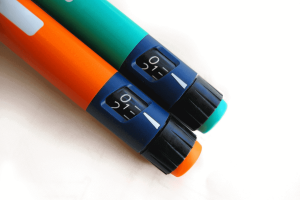4 Myths About Alcohol and Diabetes
From a carb-rich bottle of beer to a sugary glass of champagne, it’s no secret that alcoholic beverages can wreak havoc on a healthy diet–and your diabetes. However, that doesn’t mean people with the condition have to give up a glass of wine with dinner or the occasional night out with friends. In fact, health care professionals agree that people with diabetes can enjoy alcohol in moderation, just like people without the condition. Read on for four common myths about alcohol and a few tips to help you learn how to fit a couple of drinks into your healthy lifestyle.
Myth #1: People with diabetes should avoid alcohol.
According to the American Diabetes Association, research has shown that moderate drinking has little to no effect on a person’s blood glucose level. However, this doesn’t give people permission to drink as much as they would like. Alcoholic beverages still contain calories, carbs, and sugar, all of which can cause weight gain and lead to complications with your diabetes. Instead, people with diabetes should follow the same guidelines recommended for people without the condition: Men should enjoy no more than two alcoholic beverages per day, while women should have one. It is important to remember that one drink is equivalent to a 12 oz beer, 5 oz glass of wine, or 1.5 oz of distilled spirits, such as vodka, rum, gin, etc. Check out this blog post for more information on blood sugars!
Myth #2: Drinking alcohol is bad for my healthy diet.
This is a common myth, thanks to restaurant bar menus that offer extra sweet margaritas and pint-sized glasses of beer. Research has shown that moderate consumption of certain types of alcohol, specifically one glass of one, have several health benefits. Resveratrol, a chemical found in red wine, has been shown to raise levels of HDL cholesterol (the “good” kind). Studies have also shown that moderate alcohol consumption may help adults with diabetes become more sensitive to insulin, however, this evidence is limited. Check out some other healthy tips for after the holidays in this blog post!
Myth #3: Alcohol can prevent my diabetes medications from working.
People who take insulin or glucose-lowering medications may be concerned about the effect that alcohol will have on their medication. Physicians warn that alcohol consumption can lead to lower blood sugar, causing an increased risk of hypoglycemia. However, most people can fight this problem with a few easy steps. First, it’s important to remember never to drink alcohol on an empty stomach. This will make your sugar levels drop faster. Never give up one food earlier in the day, thinking that you can “save” the carbs for a drink later. Finally, make sure to drink slowly and keep a refreshing, zero-calorie drink, like water, handy.
Myth #4: There aren’t any diabetes-friendly drinks available.
Instead of giving up alcohol altogether, make a few healthy swaps so that you can have your drink and enjoy it, too. Go for light beers instead of high-end craft labels. The lighter ones offer fewer calories and carbs. For mixed drinks and cocktails, choose calorie-free mixers to give your drink an extra punch. Diet soda, club soda, and diet tonic water will spice up your drink without adding too many unhealthy calories.
Summary
There are many myths out there about alcohol and diabetes, but they aren’t all true. Studies show that moderate drinking is okay and may actually show some benefits. Eating regularly and making healthy swaps allow you to enjoy your favorite adult beverages from time to time!




